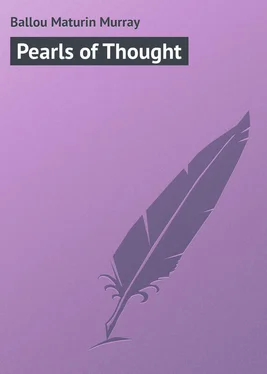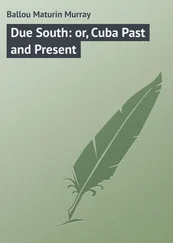Maturin Ballou - Pearls of Thought
Здесь есть возможность читать онлайн «Maturin Ballou - Pearls of Thought» — ознакомительный отрывок электронной книги совершенно бесплатно, а после прочтения отрывка купить полную версию. В некоторых случаях можно слушать аудио, скачать через торрент в формате fb2 и присутствует краткое содержание. Жанр: foreign_prose, foreign_language, на английском языке. Описание произведения, (предисловие) а так же отзывы посетителей доступны на портале библиотеки ЛибКат.
- Название:Pearls of Thought
- Автор:
- Жанр:
- Год:неизвестен
- ISBN:нет данных
- Рейтинг книги:5 / 5. Голосов: 1
-
Избранное:Добавить в избранное
- Отзывы:
-
Ваша оценка:
- 100
- 1
- 2
- 3
- 4
- 5
Pearls of Thought: краткое содержание, описание и аннотация
Предлагаем к чтению аннотацию, описание, краткое содержание или предисловие (зависит от того, что написал сам автор книги «Pearls of Thought»). Если вы не нашли необходимую информацию о книге — напишите в комментариях, мы постараемся отыскать её.
Pearls of Thought — читать онлайн ознакомительный отрывок
Ниже представлен текст книги, разбитый по страницам. Система сохранения места последней прочитанной страницы, позволяет с удобством читать онлайн бесплатно книгу «Pearls of Thought», без необходимости каждый раз заново искать на чём Вы остановились. Поставьте закладку, и сможете в любой момент перейти на страницу, на которой закончили чтение.
Интервал:
Закладка:
Beauty is the first present nature gives to women and the first it takes away. — Méré.
In ourselves, rather than in material nature, lie the true source and life of the beautiful. The human soul is the sun which diffuses light on every side, investing creation with its lovely hues, and calling forth the poetic element that lies hidden in every existing thing. — Mazzini.
Beauty is God's handwriting, a wayside sacrament. — Milton.
Beauty deceives women in making them establish on an ephemeral power the pretensions of a whole life. — Bignicout.
If there is a fruit that can be eaten raw, it is beauty. — Alphonse Karr.
Those critics who, in modern times, have the most thoughtfully analyzed the laws of æsthetic beauty, concur in maintaining that the real truthfulness of all works of imagination – sculpture, painting, written fiction – is so purely in the imagination, that the artist never seeks to represent the positive truth, but the idealized image of a truth. — Bulwer-Lytton.
An outward gift which is seldom despised, except by those to whom it has been refused. — Gibbon.
It is impossible that beauty should ever distinctly apprehend itself. — Goethe.
Bed.– The bed is a bundle of paradoxes: we go to it with reluctance, yet we quit it with regret; we make up our minds every night to leave it early, but we make up our bodies every morning to keep it late. — Colton.
What a delightful thing rest is! The bed has become a place of luxury to me! I would not exchange it for all the thrones in the world. — Napoleon.
Beggars.– He is never out of the fashion, or limpeth awkwardly behind it. He is not required to put on court mourning. He weareth all colors, fearing none. His costume hath undergone less change than the Quaker's. He is the only man in the universe who is not obliged to study appearances. — Lamb.
Aspiring beggary is wretchedness itself. — Goldsmith.
Benevolence.– There cannot be a more glorious object in creation than a human being, replete with benevolence, meditating in what manner he might render himself most acceptable to his Creator by doing most good to his creatures. — Fielding.
Genuine benevolence is not stationary but peripatetic. It goeth about doing good. — Nevins.
It is an argument of a candid, ingenuous mind to delight in the good name and commendations of others; to pass by their defects and take notice of their virtues; and to speak or hear willingly of the latter; for in this indeed you may be little less guilty than the evil speaker, in taking pleasure in evil, though you speak it not. — Leighton.
The root of all benevolent actions is filial piety and fraternal love. — Confucius.
True benevolence is to love all men. Recompense injury with justice, and kindness with kindness. — Confucius.
It is in contemplating man at a distance that we become benevolent. — Bulwer-Lytton.
Bible.– As those wines which flow from the first treading of the grapes are sweeter and better than those forced out by the press, which gives them the roughness of the husk and the stone, so are those doctrines best and sweetest which flow from a gentle crush of the Scriptures and are not wrung into controversies and commonplaces. — Bacon.
They who are not induced to believe and live as they ought by those discoveries which God hath made in Scripture, would stand out against any evidence whatever; even that of a messenger sent express from the other world. — Atterbury.
But what is meant, after all, by uneducated , in a time when books have come into the world – come to be household furniture in every habitation of the civilized world? In the poorest cottage are books – is one book, wherein for several thousands of years the spirit of man has found light and nourishment and an interpreting response to whatever is deepest in him. — Carlyle.
A stream where alike the elephant may swim and the lamb may wade. — Gregory the Great.
All human discoveries seem to be made only for the purpose of confirming more strongly the truths come from on high, and contained in the sacred writings. — Herschel.
I am heartily glad to witness your veneration for a book which, to say nothing of its holiness or authority, contains more specimens of genius and taste than any other volume in existence. — Landor.
Bigotry.– A proud bigot, who is vain enough to think that he can deceive even God by affected zeal, and throwing the veil of holiness over vices, damns all mankind by the word of his power. — Boileau.
Persecuting bigots may be compared to those burning lenses which Lenhenhoeck and others composed from ice; by their chilling apathy they freeze the suppliant; by their fiery zeal they burn the sufferer. — Colton.
A man must be excessively stupid, as well as uncharitable, who believes there is no virtue but on his own side. — Addison.
The worst of mad men is a saint run mad. — Pope.
Biography.– As in the case of painters, who have undertaken to give us a beautiful and graceful figure, which may have some slight blemishes, we do not wish them to pass over such blemishes altogether, nor yet to mark them too prominently. The one would spoil the beauty, and the other destroy the likeness of the picture. — Plutarch.
Biographies of great, but especially of good men, are most instructive and useful as helps, guides, and incentives to others. Some of the best are almost equivalent to gospels – teaching high living, high thinking, and energetic action for their own and the world's good. — Samuel Smiles.
It is rarely well executed. They only who live with a man can write his life with any genuine exactness and discrimination; and few people, who have lived with a man, know what to remark about him. — Johnson.
History can be formed from permanent monuments and records; but lives can only be written from personal knowledge, which is growing every day less, and in a short time is lost forever. — Johnson.
Occasionally a single anecdote opens a character; biography has its comparative anatomy, and a saying or a sentiment enables the skillful hand to construct the skeleton. — Willmott.
To be ignorant of the lives of the most celebrated men of antiquity is to continue in a state of childhood all our days. — Plutarch.
Birth.– Noble in appearance, but this is mere outside; many noble born are base. — Euripides.
Blessings.– The good things of life are not to be had singly, but come to us with a mixture; like a schoolboy's holiday, with a task affixed to the tail of it. — Charles Lamb.
Blessedness consists in the accomplishment of our desires, and in our having only regular desires. — St. Augustine.
We mistake the gratuitous blessings of Heaven for the fruits of our own industry. — L'Estrange.
Health, beauty, vigor, riches, and all the other things called goods, operate equally as evils to the vicious and unjust as they do as benefits to the just. — Plato.
How blessings brighten as they take their flight! — Young.
Reflect upon your present blessings, of which every man has many: not on your past misfortunes, of which all men have some. — Charles Dickens.
Blush.– The ambiguous livery worn alike by modesty and shame. — Mrs. Balfour.
Читать дальшеИнтервал:
Закладка:
Похожие книги на «Pearls of Thought»
Представляем Вашему вниманию похожие книги на «Pearls of Thought» списком для выбора. Мы отобрали схожую по названию и смыслу литературу в надежде предоставить читателям больше вариантов отыскать новые, интересные, ещё непрочитанные произведения.
Обсуждение, отзывы о книге «Pearls of Thought» и просто собственные мнения читателей. Оставьте ваши комментарии, напишите, что Вы думаете о произведении, его смысле или главных героях. Укажите что конкретно понравилось, а что нет, и почему Вы так считаете.












